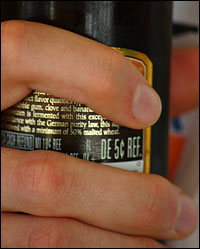Hi Umbra,
I’ve been wondering lately what happened to the returnable bottles that were so common up until some point in the ’70s. Why did the legislation go away? Does reusing bottles use less energy? It seems like it would, but I haven’t found info on advocating for bottle reuse in any of the green action plans floating around.
Anne Speck
Lafayette, Colo.
Dearest Anne,
In days of yore, portable beverages came in glass bottles, and — reading between the lines of the articles I read on the subject — smallish beverage manufacturers were dispersed across this fair nation. So bottles filled with regionally made beverages were shipped out and returned, as a matter of course, to a relatively nearby manufacturing plant for reuse.

Earn by drinking.
After the Second World War, the steel and aluminum industries were ready and able to push their own beverage containers (“cans”), which were considered disposable. Cans were much cheaper for beverage makers because they didn’t pay to ship them home again (I assume their lighter weight made them cheaper to ship to stores as well), and reuseable glass became a disadvantage in business competition. Then there was beverage industry consolidation and the little guys went out of business, and glass no longer had a deposit on it and also came to be considered disposable.
In the late 1960s, a few people in Vermont and Oregon began agitating for a return to returnable bottles and the bottle deposit system. Vermont’s first attempt at a law failed, but Oregon succeeded. Today, 11 states have “bottle bills” mandating a bottle deposit system. Under these laws, “returnable” bottles — bottles that are able to be returned for a refund — are either reused or recycled. If you were seeing returnable bottles in the 1970s and now you don’t, perhaps you have moved states?
Multiple other states have tried to have bottle bills, or expand current ones, or are now trying to do so. In your lovely Colorado, for instance, legislators have tried to pass a bottle bill more than once. There have been national bottle bill efforts as well. Often these efforts have met resistance from business. Deposit systems are an added hassle for beverage makers, packagers, and retailers. In a typical deposit scheme, the retailer pays the manufacturer — let’s say five cents per bottle. That price is passed on to the consumer, but when the consumer returns the bottle she gets back the five cents, and the same goes for a retailer. Often the retailer receives a handling fee upon return, as well. Glass bottles are often sterilized and refilled if they are in good condition, but everything else, of course, is recycled. If you were a store or a large corporation, would you rather deal with used containers or not?
It’s easy to paint a sort of Evil Corporation picture because major beverage companies have spent quite a bit of time directly lobbying against bottle bills and also — scandale — starting anti-littering campaigns in order to shift the focus of the discussion from producers to consumers. Keep America Beautiful was started by bottlers and packagers in the 1950s and has focused on what citizens can do to keep America clean ever since — it’s not bottles that cause litter, it’s people that cause litter.
Now, however, according to my source inside the world of waste reduction, the big beverage people are slowly joining the movement toward more deposit legislation. I guess they weren’t looking so good on the corporate responsibility front and it began to bother them. And altruism, maybe.
Bottle deposit bills are incredibly useful for litter control. Litter was the primary motivation for passing them in the 1970s, and it still is today. It’s not such an issue at home, where you likely put your bottles into the recycling. But if you’re not at home, getting a good deposit back might be just the added incentive you need to keep that bottle out of the grass/woods/tangleweed/trash. I grew up in a deposit state, so I can speak directly to the motivation that five cents can provide. And yes, refilling containers is better than both recycling them and throwing them away.
Nickelly,
Umbra

